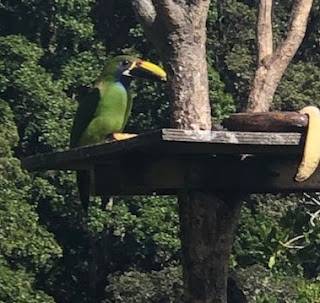 |
| Costa Rica is a bird-watcher's paradise. The touconette is the most exciting bird we saw on our trip. |
Is your book for sale on Amazon? If so, in your Author Profile have you added your biography in different languages? On a recent trip to Costa Rica, I learned how to use a language translator on Google. I tried it for my profile page and it worked. Here’s how:
- Go to the edit function for your Author Profile page in Author Central.
- My bio was outdated, so I spruced it up.
- Find “Your biographies,” where it says, “Do you have translations of your biography in other languages? You can add other versions of your biography here, so your readers can get to know you—wherever they are.”
- Languages offered are: English, French, German, Italian, Japanese, Portuguese, and Spanish.
- Copy your bio.
- Go to Google. I typed in “Spanish translator.”
- On the left side, plug in your bio in English.
- On the right side, choose the language you want to translate, and paste in your English bio.
- Voilà! You have your translation.
- Go back to your Author Profile page, click the green button that asks for your bio in another language, and paste your new bio in. Click Review, then Publish.
- If you’re not able to paste the translation directly from Google, paste it into a Word document, and copy and paste from there.
- A message will tell you when your bio in another language will go live.Then for fun, go to the drop-down menu and button that allows you to see how your Author Page looks in an assortment of other countries.
Photo credit: Linda Wilson
 |
| Sketch by Nancy Batra, illustrator of A Packrat's Holiday: Thistletoe's Gift, for the cover of Waddles the Duck: Hey, Wait for Me! Coming Soon! |
Linda Wilson writes stories for young
children. Visit
Linda at https://www.lindawilsonauthor.com. Sign up
for Linda’s quarterly giveaways. Choose your prize!
Find Linda’s books at https://www.amazon.com/author/lindawilsonchildrensauthor.
Tweetable:
https://www.writersonthemove.com/2022/01/a-tip-to-reach-wider-market-on-amazon.html

























